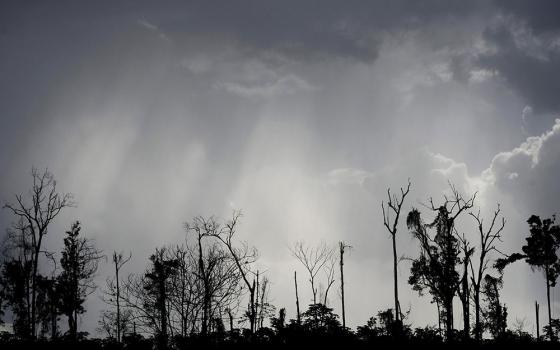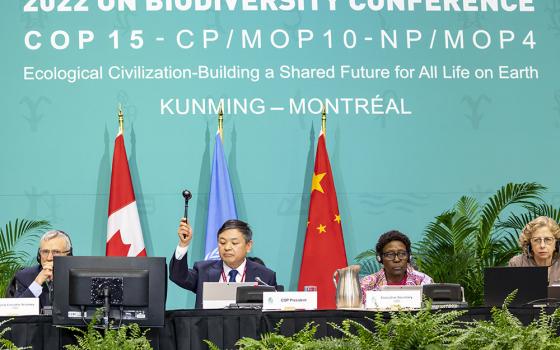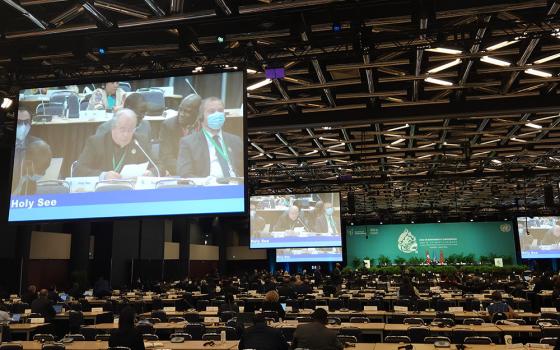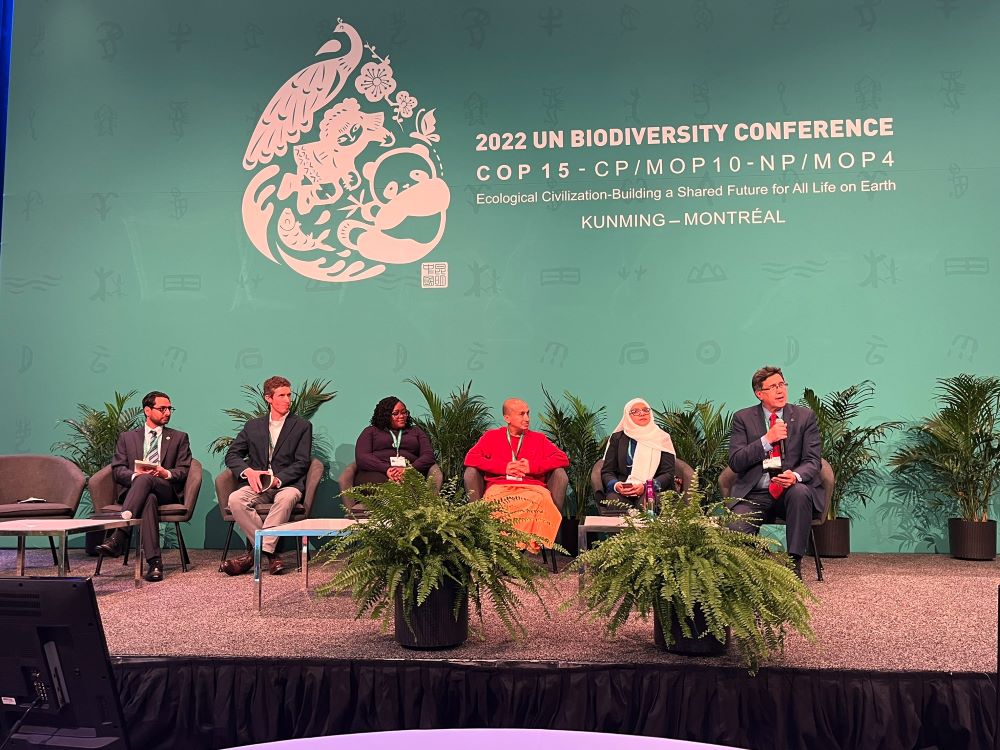
A panel of faith representatives take part in a discussion on the global state of biodiversity Dec. 7 at the COP15 United Nations biodiversity conference, in Montreal. (Faiths at COP15/Wesley Cocozello)
Through a series of events on the second day of the United Nations biodiversity summit known as COP15, faith-based organizations displayed not just an elevated presence at the high-stakes proceedings, but also the contribution religion can make to global efforts to protect and preserve nature.
"We're facing a climate emergency and we're facing a biodiversity crisis. And the toolbox [to address them] contains a number of tools … faith is definitely one of those tools," said Kamran Shezad, a sustainability advisor with Bahu Trust, a Sufi Muslim organization in the United Kingdom, during an official side event Dec. 8 at COP15, being held in Montreal.
"If we go by statistics that 85% of the world's population identifies with a faith, you can't take that out of the equation," he said.
The afternoon event focused on the critical role faith groups say they can play in the development and implementation of the post-2020 Global Biodiversity Framework that nations are negotiating at the conference. The once-a-decade deal will look to set conservation targets for the next 10 years and beyond in an effort to halt, and ultimately reverse, biodiversity loss that has been accelerating at dangerous rates in recent decades. A major focus is a proposal to conserve 30% of lands and waters by 2030, though civil society groups are already pushing to raise the figure to at least 50%.
Advertisement
"We are waging a war on nature," said U.N. Secretary-General Antonio Gueterres in his opening remarks Dec. 7. "Ecosystems have become playthings of profit. Human activities are laying waste to once-thriving forests, jungles, farmland, oceans, rivers, seas and lakes."
"We did this to ourselves," added Inger Anderson, executive director of the U.N. Environment Programme. "But this COP is our chance to start protecting and repairing the web of life."
Observers have called the framework negotiations a potential "Paris moment" for biodiversity, with the possibility to rally nations around conservation in a similar way to how the 2015 Paris Agreement has served as a catalyst for action on climate change.
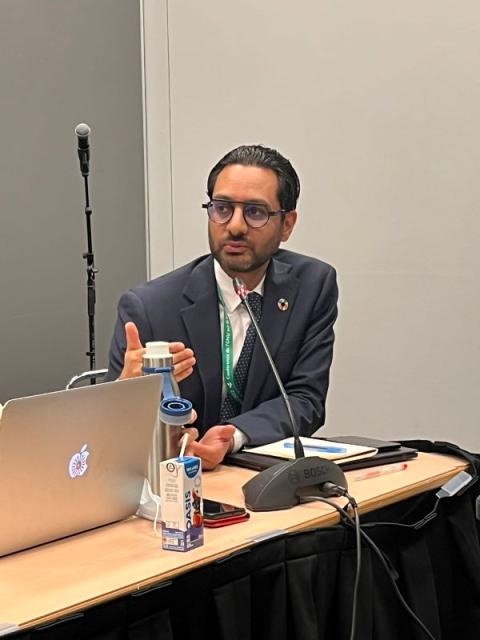
Gopal Patel, co-founder of Bhumi Global and coordinator of the Faiths at COP15 coalition, speaks during an official side event at the COP15 United Nations biodiversity conference on Dec. 8. (Faiths at COP15/Wesley Cocozello)
But the Global Biodiversity Framework will remain a piece of paper if it lacks the structure to implement its 22 targets, said Gopal Patel, co-founder of the Hindu environmental group Bhumi Global. And that's where he said centuries-long principles and practices from religion can offer lessons.
"Many of us are representatives of religions of the book, or we have scriptures or teachings. But we also come from institutions. If there was no church, would the Bible be as popular? If there wasn't Islamic organizations, would the Quran be so popular, and the same with Hindu texts?" said Patel, who is coordinator of the Faiths at COP15 coalition. "We know that these books and these scriptures emerged at a certain time and place, but infrastructure had to emerge also in order to get those teachings out there, and that's what's allowed these teachings to persist and to live for thousands of years."
"We know how to have long-term success. And so let's lend our voices to the negotiations to help them have long-term success that they're looking for," he said.
The event, titled Faith Voices Raising Ambition for a Strong Global Biodiversity Framework, marked the first time that faith-based organizations held an official side event at a U.N. biodiversity conference. It came about in part with support from the U.N. Environment Programme's Faith for Earth Initiative, which since 2017 has worked to elevate the role that faith communities can play in international efforts to limit climate change, protect biodiversity and forge a more sustainable relationship between humans and the rest of nature.
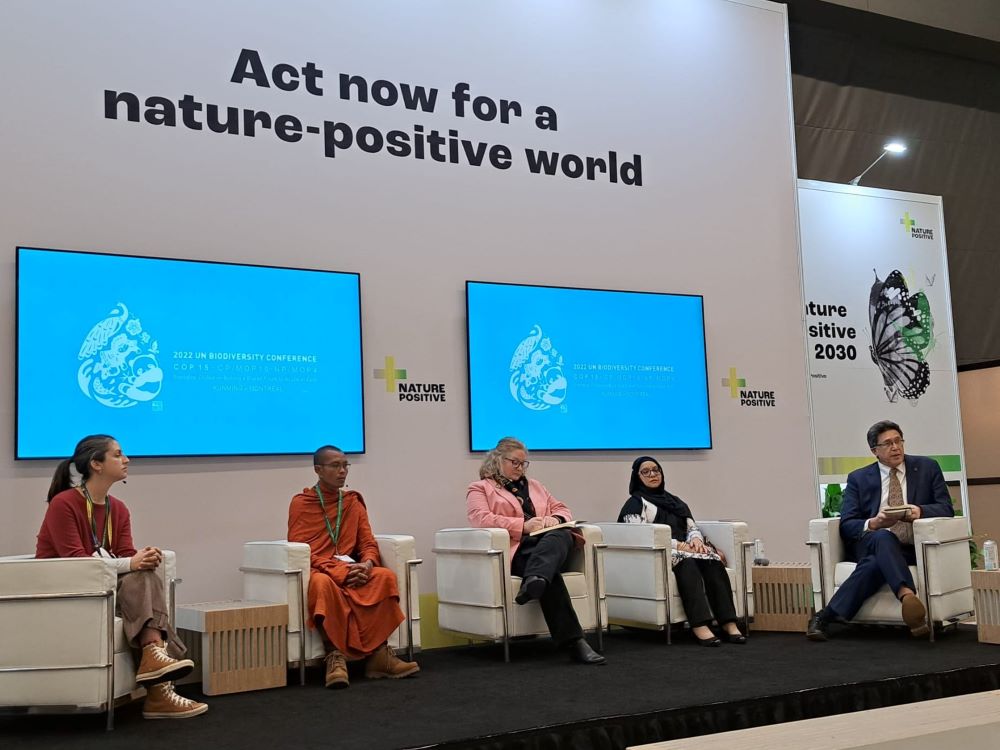
Representatives of world religions speak about faith priorities for negotiations at the United Nations biodiversity conference, COP15, during at event at the summit Dec. 8. Pictured, from left, are Alexandra Masako Goossens-Ishii of Soka Gakkai International; Venerable Tho Thoross of the Monk Community Forest; Amy Echeverria of the Missionary Society of St. Columban; Husna Ahmad of Global One 2015; and Chris Elisarsa of World Evangelical Alliance. (Faiths at COP15/Wesley Cocozello)
As many as 40 faith actors are present in Montreal for the biodiversity summit, believed to be the largest such showing from the religious community. Concerns with growing environmental threats to the planet — from climate change to deforestation, species loss and pollution — have led religious leaders to raise moral voices for a change in direction. But they also seek to contribute.
Earlier in the day, representatives of various faiths highlighted some of the priorities they collectively hold for the final version of the Global Biodiversity Framework. The priorities came from a multifaith document outlining goals and recommendations on protecting biodiversity that were developed over the past two years. More than 55 faith-based organizations, representing all major religions and spanning most of the globe, have now endorsed the priorities.
Among them are greater ambition in biodiversity targets; increased emphasis on interrelated solutions and human rights, especially the inclusion of Indigenous communities in decision-making; and an implementation mechanism so actions are not delayed.
"We the faith groups believe that genuine, transformative change is needed at all levels to achieve living in harmony with nature and an equitable, rights-based nature positive world. … This is our moment to define our aspiration for a planet we can be proud of, where inequality and injustice are removed, and we save our beautiful planet. Our faith voices must be heard, amplified and taken seriously," said Husna Ahmad, CEO of Global One, a faith-based NGO for women and secretary-general of the World Muslim Leadership Forum, adding "Real, transparent action is what we want to see."
During both events, panelists described the lack of engagement between the faith community and member states in U.N. settings, and hesitancy among some delegates to express their own beliefs. That may be due to fears over negative aspects, Ahmad said, displayed in wars, extremism and terrorism carried out in the name of a religion.
To contrast that, she said religious representatives at COP15 and in other international settings are "bringing hope, we're bringing love, we're bringing peace. So that's the side that we need to really come forward with."
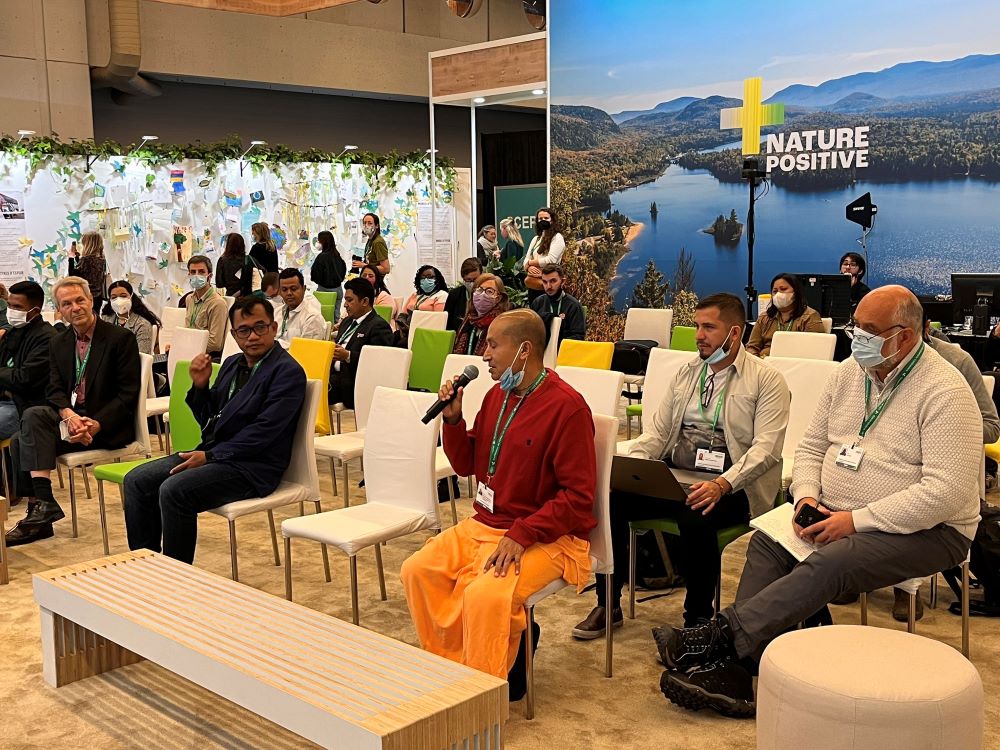
Gauranga Das, director of the ISKCON Govardhan Ecovillage, asks a question to a faith panel at an event Dec. 8 at the COP15 United Nations biodiversity conference, in Montreal. (Faiths at COP15/Wesley Cocozello)
During the official side event, panelists representing Christianity, Islam, Hinduism and Brahma Kumaris shared examples of the work their organizations are doing now around conservation. The Krishna-led Govardhan Ecovillage, in Palghar, India, works to merge environmentalism, animal rights and spirituality, while Muslims and Christians in Birmingham, England, have created nature maps that emphasize the abundance of trees and green space over roads and buildings in neighborhoods while highlighting faith teachings.
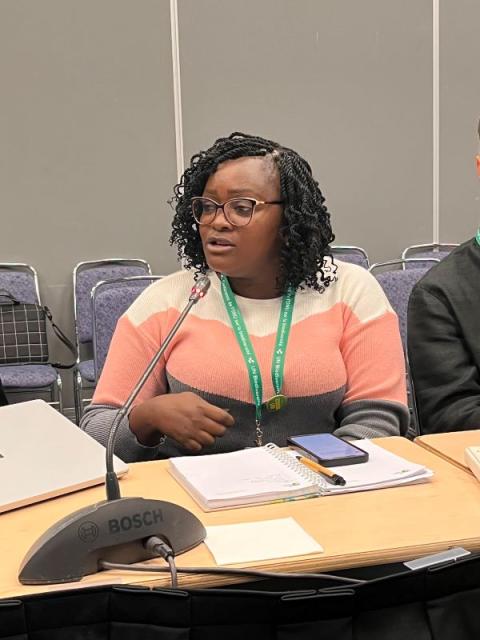
Carol Kiiru of Laudato Si' Movement, biodiversity and climate change campaign manager for the Laudato Si’ Movement, speaks during an official side event at the COP15 United Nations biodiversity conference on Dec. 8. (Faiths at COP15/Wesley Cocozello)
Along with spreading environmental education around the globe, Christian-based A Rocha International has worked with communities in Ghana, India and Peru to restore forests, protect elephants, owls and other species, and work with farmers to implement sustainable agriculture practices.
Caroline Kiiru, biodiversity and climate change campaign manager for the Laudato Si’ Movement, said that the concept of integral ecology calls people of faith to "also be conscious and be able to recognize that the same God that we pray to is the same God who has created us to be protectors of that environment."
Also on Dec. 8, the U.N. Environment Programme, in collaboration with World Wildlife Fund and Trillion Trees, published the first-ever tree growing guide for faith groups.
Throughout the 13 days of COP15, the multifaith coalition has planned a schedule of daily events at their faith pavilion in the conference's main venue, including hosting daily peace breaks for all delegates and attendees. Multifaith prayer services are also planned for the weekend, and the Montreal Archdiocese will celebrate a Mass Dec. 10 at Mary Queen of the World Cathedral. Later that day, faith groups are expected to take part in a march for biodiversity and human rights that will begin in Jeanne-Mance Park.





